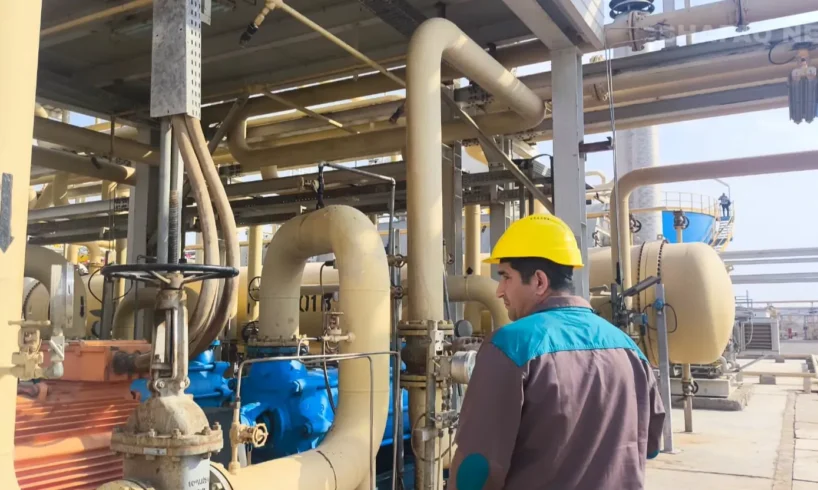
Shafaq News
Iraq’s northern oil sector has
entered a phase of relative stability after years of security and
administrative disruptions. A source at the North Oil Company confirmed to Shafaq News that
production from Kirkuk’s main fields has reached about 320,000 barrels per day
(bpd), showing that technical and administrative operations have steadied and
the company has regained much of its operational capacity.
BP Drives Revival
Production in Kirkuk province is
gradually recovering,
driven by the Bai Hassan, Jambur, Havana, and Khabbaz fields — the backbone of
the region’s energy supply. Daily pumping operations are running smoothly,
placing output at roughly 71% of its pre-2023 level.
However, over the past two decades,
political disputes, aging infrastructure, and security challenges have repeatedly disrupted
operations. The current rebound,
supported by technical upgrades and strategic partnerships, suggests a
potential return toward these historical production levels.
“British energy firm British
Petroleum (BP) continues to provide technical and advisory support to northern
fields, aiming to raise output by roughly 150,000 bpd,” the source noted, pointing out that
BP has completed a key phase of field studies and reservoir evaluations at Bai
Hassan, Jambur, and Havana.
BP is also collaborating with Iraqi
technical teams to modernize production systems, implement advanced artificial
lift technologies, and improve well efficiency.
The source emphasized that even
modest improvements could yield tens of thousands of additional barrels daily,
noting that artificial lift and advanced control mechanisms can enhance
extraction efficiency, reduce downtime, and extend the life of mature wells.
Export Route Unlocked
With production stabilizing, focus
is shifting to exports, which depend on the Iraq–Turkiye pipeline and the
coordination between Baghdad and Erbil.
“The North Oil Company has completed
all technical preparations to resume crude exports through the Kirkuk–Ceyhan
pipeline,” the source confirmed, highlighting that three recent tests verified
the pipeline’s integrity and the efficiency of pumping through northern
pressure stations. The company is awaiting government approval to resume
exports as Baghdad and Erbil finalize a unified shipment arrangement.
The development follows a positive turn in relations:
Iraq and the Kurdistan Region recently resolved their oil dispute, enabling the
Region to export around 190,000 bpd through Turkiye’s Ceyhan pipeline. The
resolution ended a two-year halt caused by legal disagreements over oil
ownership and revenue sharing.
Read more: Resumption of oil exports from Kurdistan: Fragile stability with strategic implications
Recent tests also demonstrated that
the pipeline can handle over 500,000 bpd without technical issues. Since its
completion in 1970, the crude
line has served as Iraq’s main northern export route, with a design
capacity of about 1.4 million bpd.
Before the 2023 suspension, it
transported roughly 450,000 bpd, combining crude from Kirkuk and the Kurdistan
Region. Today’s output of 320,000 bpd — around 23% of full design capacity — is regarded not only as an
operational recovery but also as an untapped potential that could be realized
through further political alignment, particularly with Turkiye or within
broader Middle Eastern energy diplomacy.
Read more: Iraq–Turkiye pipeline restart reshapes energy balance
Rising
Production, Enduring Bottlenecks
The economic significance of
Kirkuk’s output is closely linked to its export capacity. Oil remains Iraq’s
backbone, generating roughly 85% of government revenues and around 40% of GDP,
according to 2024 World Bank and
International Monetary Fund (IMF) assessments. Meanwhile, Kirkuk’s
production accounts for nearly 10% of the country’s total crude exports,
representing an estimated $9 billion in annual revenue at the 2024 average
price of $78 per barrel.
Despite the recent progress,
technical and administrative challenges persist. Differences in measurement and
control systems, along with unresolved revenue-sharing arrangements, continue
to complicate full integration between Kirkuk and Kurdistan Region exports.
The pipeline network also requires
continuous maintenance, and any disruption could halt exports.
“The challenge extends beyond
pumping oil to ensuring international-grade logistics and compliance with Iraqi
and global regulations,” the source emphasized, stressing that transparent
contracts, routine oversight, and predictable payment systems are essential to
maintain investor confidence and prevent renewed tension in the northern energy
sector.
Energy expert Ali al-Bayati
highlighted to Shafaq News that the northern fields have a potential capacity
exceeding 600,000 bpd, although insufficient investment in pipelines,
processing, and pumping facilities has left much of that potential untapped.
“Ongoing cooperation with BP marks a
significant shift in field development,” al-Bayati added, noting that raising
output to 470,000 bpd would strengthen Iraq’s position in regional oil markets
and boost state revenues.
Written and edited by Shafaq News
staff.





